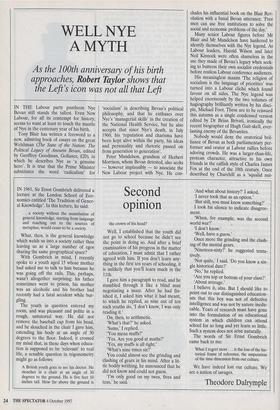Second opinion
IN 1961, Sir Ernst Gombrich delivered a lecture at the London School of Eco- nomics entitled 'The Tradition of Gener- al Knowledge'. In this lecture, he said:
... a society without the assimilation of general knowledge, starting from language and reaching out to the sources of metaphor, would cease to be a society.
What, then, is the general knowledge which welds us into. a society rather than leaving us as a large number of egos sharing the same geographical space?
With Gombrich in mind, I recently spoke to a youth aged 15 whose mother had asked me to talk to him because he was going off the rails. This, perhaps, wasn't altogether surprising: his father sometimes went to prison, his mother was an alcoholic and his brother had recently had a fatal accident while bur- gling.
The youth in question entered my room, and was pleasant and polite in a rough, untutored way. He did not remove the baseball cap from his head, and he slouched in the chair I gave him, extending his body at an angle of 30 degrees to the floor. Indeed, it crossed my mind that, in these days when educa- tion is supposed to be 'relevant' to real life, a sensible question in trigonometry might go as follows:
A British youth goes to see his doctor. He slouches in a chair at an angle of 30 degrees to the ground. He is five feet 10 inches tall. How far above the ground is the crown of his head?
Well, I established that the youth did not go to school because he didn't see the point in doing so. And after a brief examination of his progress in the matter of education, I must admit that I rather agreed with him. If you don't learn any- thing in the first ten years of schooling, it is unlikely that you'll learn much in the 11th.
I gave him a paragraph to read, and he stumbled through it like a blind man negotiating a maze. After he had fin- ished it, I asked him what it had meant, to which he replied, as nine out of ten such youths do, 'I don't know, I was only reading it: On, then, to arithmetic.
'What's that?' he asked.
'Sums,' I replied.
'You mean maffs?'
'Yes. Are you good at maths?'
'Yes, my maffs is all right.'
'What's nine times six?'
You could almost see the grinding and clashing of gears in his mind. After a lit- tle bodily writhing, he announced that he did not know and could not guess.
'I'm only good on my twos, fives and tens,' he said. 'And what about history?' I asked. 'I never took that as an option.' 'But still, you must know something?' I took his silence to indicate disagree- ment.
'When, for example, was the second world war?'
'I don't know.'
'Well, have a guess.'
Once more the grinding and the clash- ing of the mental gears.
`Nineteen-sixty?' he suggested tenta- tively.
'Not quite,' I said. `Do you know a sin- gle historical date?'
'No,' he replied.
'Are you top or bottom of your class?' 'About average.'
I believe it, alas. But I should like to point out to our distinguished education- ists that this boy was not of defective intelligence and was not by nature inedu- cable. Years of research must have gone into the formulation of an educational system in which children can attend school for so long and yet learn so little. Such a system does not arise naturally.
The words of Sir Ernst Gombrich came back to me: What I regret most .. . is the loss of the his- torical frame of reference, the amputation of the time dimension from our culture.
We have indeed lost our culture. We are a nation of savages.
Theodore Dalrymple










































































 Previous page
Previous page